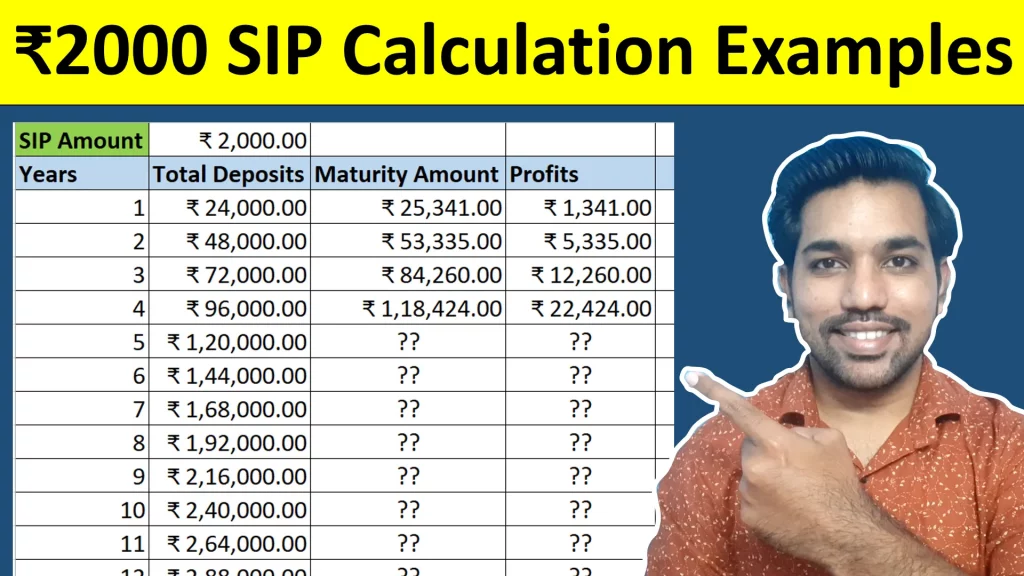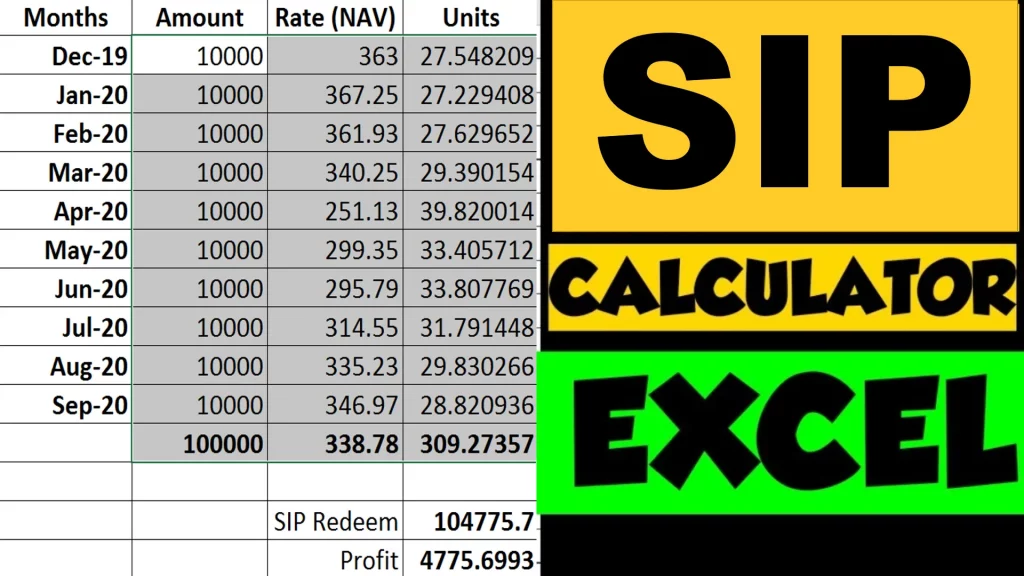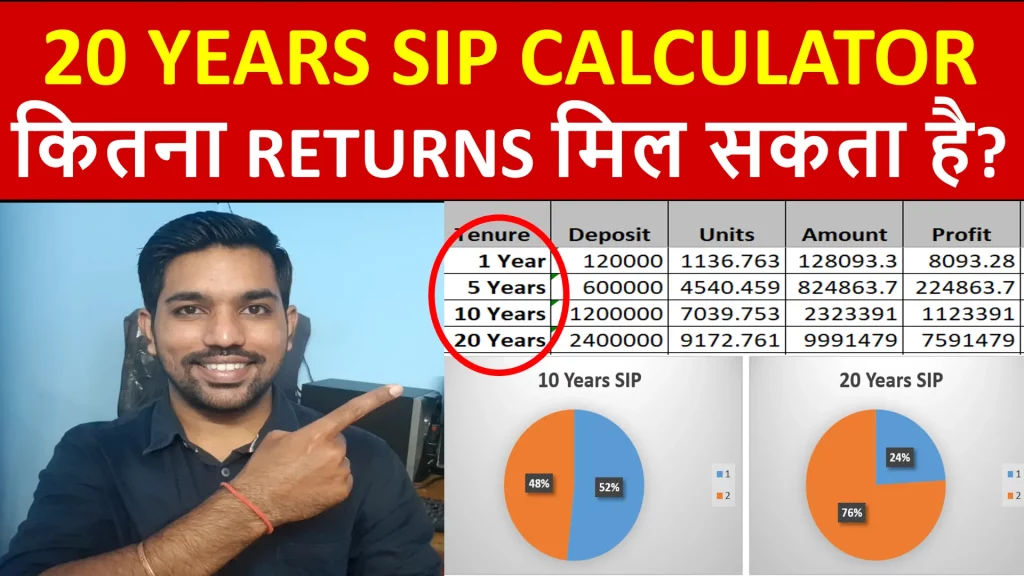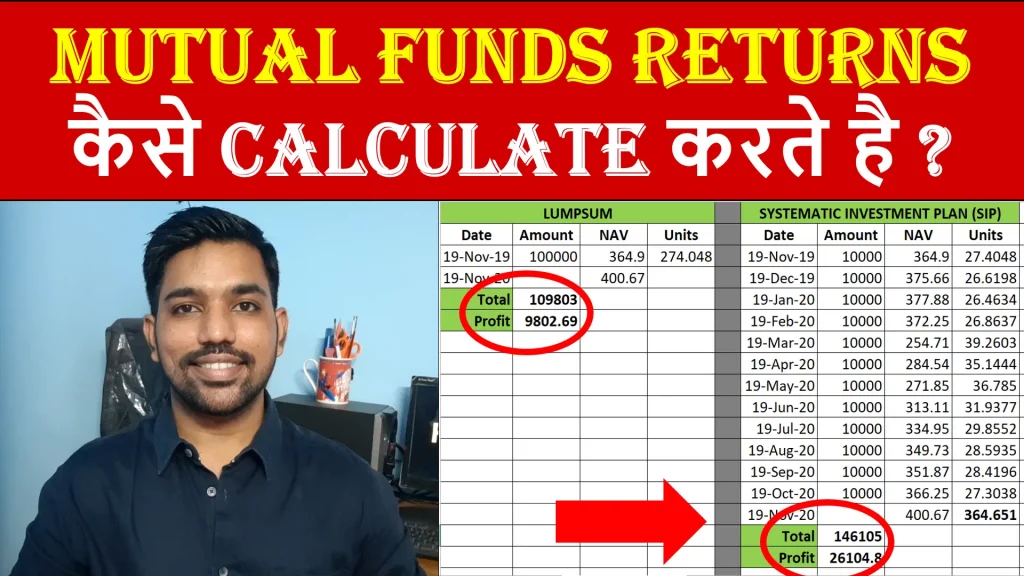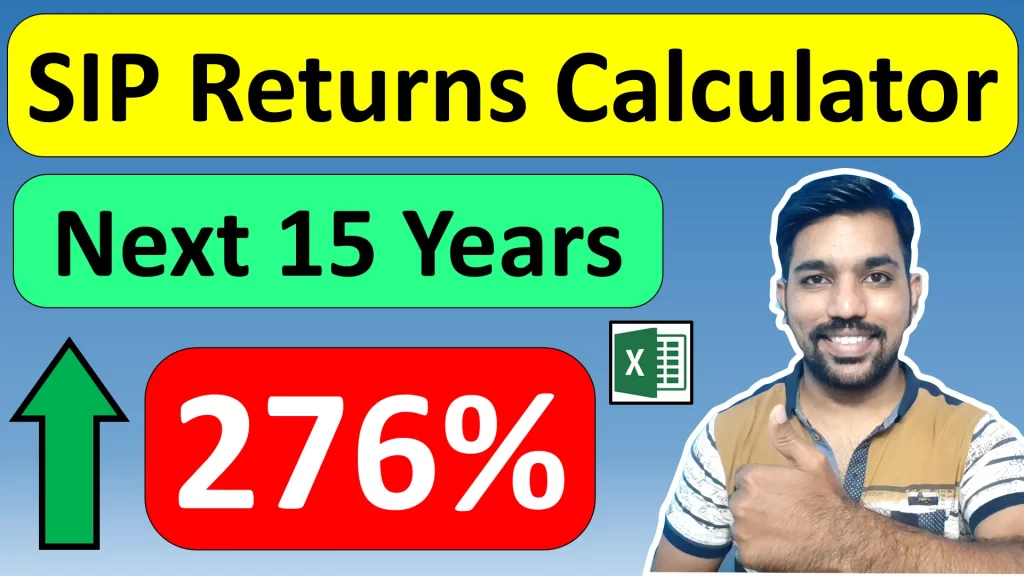One of the most asked question on my YouTube channel is, how much returns someone would get on monthly SIP of Rs. 2000 between 1 year to 15 years? Well, the answer is not straightforward since the markets (stocks and mutual funds) can be very volatile for short term as we have seen in the year 2020 (during Covid) and during 2022 (Russia-Ukraine war). But we can at least try to get approximate figures on SIP (Systematic Investment Plan) returns based on past long term returns. In this article we will see SIP Returns Calculation Examples.
In order to calculate approximate SIP returns between 1 year to 15 years in a good stock or mutual fund, we have to assume expected returns in the range of 8-12% per year. We are going to take 10% as annual returns from good stock or mutual fund, and calculate the returns on same, you will get the SIP chart as well below. You can also use SIP calculator here to calculate returns for any number of years or months based on expected rate of return you provide.
Below is the video you can watch to see calculation examples done using SIP Calculator.
SIP Returns Calculation Examples Video

As seen in above video, you can get approximately Rs. 8.36 Lacs as maturity amount by just investing Rs. 2000 per month as SIP for next 15 years. Your total deposits will be Rs. 3.6 Lacs and profits earned will be Rs. 4.76 Lacs. That’s more than the principal amount invested!
How much Returns on Rs. 2000 Monthly SIP?
Let us assume expected rate of return to be 10% per year for simplicity. Based on our SIP Calculator, below is the returns we will get for 1 year to 15 years of our SIP deposits.
Note that we have considered 10% flat return on deposits which is not the actual case in markets. Some years in market might give you more than 10% and other years might give less returns. We have to consider average returns we expect when we invest in stocks or equity mutual funds.
Considering these points, below is the table of SIP returns for Rs. 2000 monthly SIP:
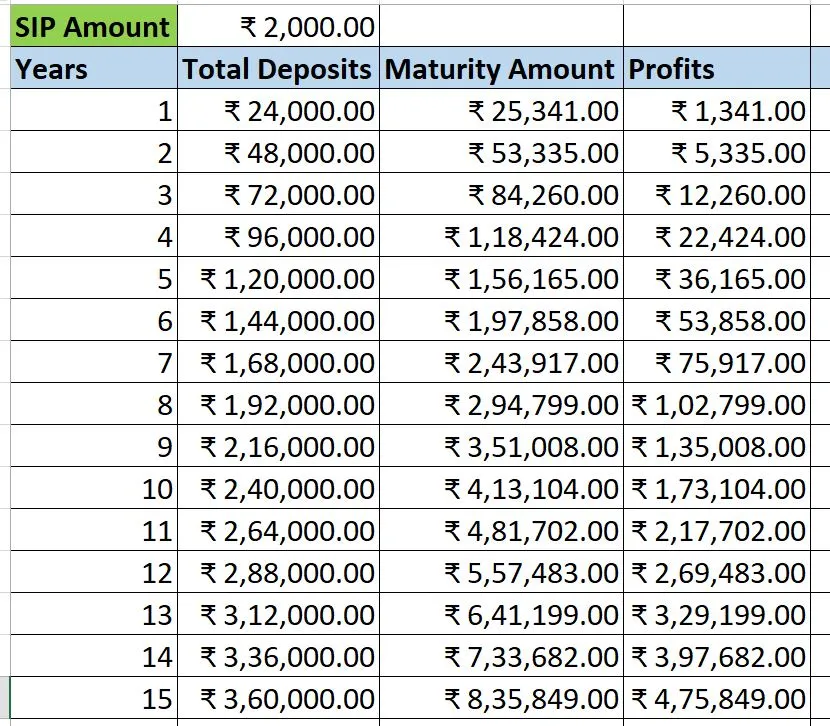
As seen above, for years between 1 to 5 years the return you might get will slightly be out of sync with the actual returns since nobody can predict the actual returns from market for short term.
But when you stay invested for more than 5 years, and the returns start to average out at 10% return every year, the returns seen above will start getting in synced with the market returns.
Overall, you can at least get better returns when doing SIP in good stocks or mutual funds compared to Fixed Deposits and Recurring Deposits.
ALSO READ: How to Start SIP Online in SBI
Does SIP give Monthly Returns?
SIP or Systematic Investment Plan is a way to invest in mutual funds regularly every month. So when your deposits are scheduled on a date, based on NAV (Net Asset Value), you’ll get required number of units.
For example, let’s say Nav = Rs. 100 of a mutual fund when you deposit Rs. 1000. So you’ll get 10 units (Rs. 1000 deposit / Rs. 100 NAV) of that mutual fund.
Now by next year let’s say the Nav becomes Rs. 110, you can seel your 10 units at this price thus making a profit of Rs. 100 (sold at Rs. 1100 – bought at Rs. 1000).
So to answer whether SIP gives us monthly returns, then yes in fact we get Daily returns on SIP! Why? That’s because NAV of mutual fund is updated every weekday, so we can buy it on one day and sell it on another day to make profits (provided NAV has increased from previous day).
It is very important to note other factors such as exit load and income tax on profits we make while selling mutual funds units. Many mutual funds charge exit load if we sell mutual funds units within 30 days or 365 days after buying them. So we need to consider exit load of mutual funds.
Also, Income Tax on STCG (Short term capital gains) and LTCG (Long term capital gains) need to be paid while selling mutual funds. Tax on STCG is 15% on equity mutual funds, whereas Tax on LTCG is 10% on profits above Rs. 1 Lac of equity mutual funds.
Watch below video to understand Income Tax on SIP.
Income Tax on SIP Video

Here’s another article about Income Tax on SIP that you can read to know more about Tax liability while selling stocks or equity mutual funds.
SIP Returns Calculation Examples – Rs. 5000 SIP
Let us take another example of SIP Returns calculation for SIP of Rs. 5000 per month. Below is the screenshot of SIP Calculator in Excel, showing you the returns on your SIP:
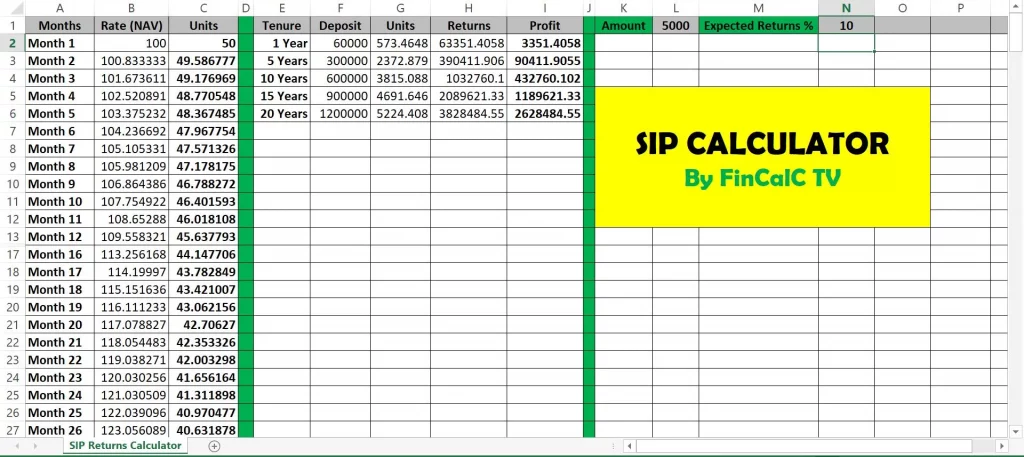
As seen above, we have taken SIP amount = Rs. 5000, and expected rate of return = 10%, so the maturity amount you’ll get for 20 years SIP will be approximately Rs. 38.3 Lacs. As seen, it has a total deposits of Rs. 12 Lacs in 20 years, and profit of Rs. 26.3 Lacs.
Again, we have to consider Tax on LTCG in this case, as the holding period for SIP is more than 1 year for SIP up to 19 years of deposits, and Tax on STCG for the last year SIP deposits if those are also redeemed after 20th year.
You can get the SIP Excel Calculator from this article and also read about how monthly SIP returns are calculated in excel. It’s a good way to check SIP returns in excel on offline mode.
ALSO READ: How Compounding works in SIP
What is the formula of SIP return?
Here are some useful formulas you should know while investing via SIP:
- While Buying: Number of Units = SIP Amount / NAV
- While Selling: Maturity Amount = Number of Units Accumulated * Latest NAV
- Calculating Profits: Profits = Maturity Amount – Total Deposit Amount
Above formulas seem to be straightforward, when we buy and sell via Lump sum Investment. But when we do SIP, we need to track deposit amount, NAV values and current number of units we hold in various mutual funds.
I personally use Moneycontrol to track my SIP investments, and it provides us a good overview about our current investment portfolio.
Also you can check this video on SIP vs Lump sum investment in Mutual Funds:

Hope you have got good idea about SIP returns calculation using examples seen above. You should always check how much returns you would get on your SIP using the SIP calculator here. Also, it is important that you attach goals with the SIP amount you invest every month.
“What gets Measured, get Managed”
– Someone

Some more Reading
- What is Step up SIP and Returns on Step up SIP [EXCEL]
- SWP Calculator in Excel
- Rs. 1000 Mutual Fund Returns for 15 Years
Save Home Loan Interest Amount!
Use Home Loan Excel Calculator that will help you to Save Interest Amount on Home Loan EMI.
Click below button to download Home Loan EMI and Prepayment Calculator in Excel:
Watch how Home Loan Calculator in Excel Works
Income Tax Calculator App – FinCalC
For Income Tax Calculation on your mobile device, you can Download my Android App “FinCalC” which I have developed for you to make your income tax calculation easy.
What you can do with this mobile App?
- Calculate Income Tax for FY 2025-26 and previous FY 2024-25
- Enter estimated Investments to check income tax with Old and New Tax Regime
- Save income tax details and track regularly
- Know how much to invest more to save income tax
- More calculators including PPF, SIP returns, Savings account interest and lot more

Use Popular Calculators:
- Income Tax Calculator
- Home Loan EMI Calculator
- SIP Calculator
- PPF Calculator
- HRA Calculator
- Step up SIP Calculator
- Savings Account Interest Calculator
- Lump sum Calculator
- FD Calculator
- RD Calculator
- Car Loan EMI Calculator
- Bike Loan EMI Calculator
- Sukanya Samriddhi Calculator
- Provident Fund Calculator
- Senior Citizen Savings Calculator
- NSC Calculator
- Monthly Income Scheme Calculator
- Mahila Samman Savings Calculator
- Systematic Withdrawal Calculator
- CAGR Calculator
I’d love to hear from you if you have any queries about Personal Finance and Money Management.
JOIN Telegram Group and stay updated with latest Personal Finance News and Topics.
Download our Free Android App – FinCalC to Calculate Income Tax and Interest on various small Saving Schemes in India including PPF, NSC, SIP and lot more.
Follow the Blog and Subscribe to YouTube Channel to stay updated about Personal Finance and Money Management topics.

